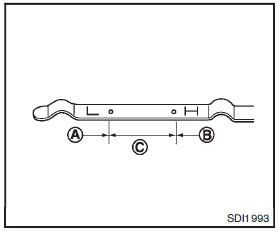Nissan Juke Owners Manual : Checking engine oil level

1. Park the vehicle on a level surface and apply the parking brake.
2. Run the engine until it reaches operating temperature.
3. Turn off the engine. Wait more than 10 minutes for the oil to drain back into the oil pan.
4. Remove the dipstick and wipe it clean.
Reinsert it all the way.
5. Remove the dipstick again and check the oil level. It should be within the rangeC . If the oil level is below A , remove the oil filler cap and pour recommended oil through the opening. Do not overfillB .
6. Recheck oil level with the dipstick.
It is normal to add some oil between oil maintenance intervals or during the breakin period, depending on the severity of operating conditions.
CAUTION
Oil level should be checked regularly.
Operating the engine with an insufficient amount of oil can damage the engine, and such damage is not covered by the warranty.
 Engine oil
Engine oil
...
 Changing engine oil and filter
Changing engine oil and filter
Change the engine oil and filter according to the maintenance log shown in the
NISSAN Service and Maintenance Guide.
Vehicle set-up
1. Park the vehicle on a level surface and apply the parking bra ...
Other materials:
B1006, B1007, B1008, B1009, B1010 diagnosis sensor unit
DTC Logic
DTC DETECTION LOGIC
DTC CONFIRMATION PROCEDURE
1.CHECK SELF-DIAG RESULT
With CONSULT-III
1. Turn ignition switch ON.
2. Perform “Self Diagnostic Result” mode of “AIR BAG” using CONSULT-III.
Without CONSULT-III
1. Turn ignition switch ON.
2. Check the air bag warning lamp statu ...
Brake pedal position switch
Component Function Check
1.CHECK BRAKE PEDAL POSITION SWITCH FUNCTION
With CONSULT-III
1. Turn ignition switch ON.
2. Select “BRAKE SW1” in “DATA MONITOR” mode of “ENGINE” using CONSULT-III.
3. Check “BRAKE SW1” indication as per the following conditions.
Without CONSULT-III
1. Turn ignitio ...
Turn signal lamp circuit
Component Function Check
1.CHECK TURN SIGNAL LAMP
CONSULT-III ACTIVE TEST
1. Select “FLASHER” of BCM (FLASHER) active test item.
2. With operating the test items, check that the turn signal lamps is turned ON.
LH : Turn signal lamps (LH) ON
RH : Turn signal lamps (RH) ON
Off : Turn signal lam ...
